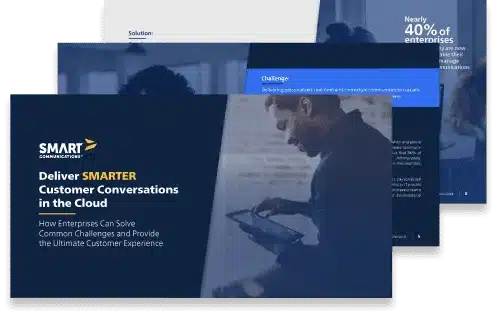Drive Efficiencies and Cost-Savings: Migrate and Consolidate CCM Solutions
By: Chris Murphy, Vice President of Product Marketing at Smart Communications
During times of economic uncertainty, the only constant is change—which is why businesses need to be agile and always looking ahead. With markets shifting, inflation rising and jobs fluctuating, it’s a good time to focus on building a technology ecosystem that allows enterprises to meet both the near- and long-term needs of the business; not to mention, it also helps to future-proof in the face of unknown business needs. When it comes to customer communications management (CCM), legacy systems slow down operations, provide little to no business user control and can be quite costly. If this is a key challenge for businesses, CCM migration and consolidation should be a priority.
As enterprises around the world are being tasked with cutting costs and doing more with less, employees need the right solutions to support existing customers while also attracting new customers. The right systems and solutions enable better processes and more consistency. A consolidated tech ecosystem allows enterprises to increase operational efficiency and reduce overall costs—a critical focus in a down economy. Automating and digitizing processes reduces the burden on IT, further lowering costs while allowing for internal innovation. To achieve an improved CX and meet business goals, enterprises must consolidate technology and adopt a modern, pure-cloud CCM solution.
Business Drivers for CCM Migration from Legacy to Cloud
There’s no shortage of reasons for CCM migration from legacy systems to a sophisticated, pure-cloud customer communications management platform. But the best way to start is by assessing existing communications processes and technology.
If you’re currently using a multitude of applications to generate customer communications, consolidating into a single enterprise system will help streamline internal processes and workflows. Ultimately, the level of speed and agility a cloud solution offers simply can’t be matched by legacy systems. Connecting all mission-critical technologies into a single, flexible ecosystem allows teams to take advantage of new technology faster and accelerate response times for customers.
Migrating to a modern customer communications management solution that integrates seamlessly with existing core systems offers further operational benefits by allowing disparate systems to communicate and diminishing the number of integrations that must be managed. With a sophisticated solution, automation and personalization make interactions more dynamic and productive. Best of all, moving to an enterprise CCM would make change management and future upgrades simpler.
In keeping with widespread digital transformation initiatives, many organizations have implemented an enterprise-wide cloud strategy aimed at driving operational efficiency and competitive advantage. Moving to a cloud-native solution allows businesses to align customer communications with corporate strategy to reduce overall costs, reprioritize IT resources and maintain security and compliance. At the same time, modern customer communications solutions allow businesses to support enterprise-wide efforts to improve CX—meeting CSAT goals and building loyalty.
RELATED READING TO DOWNLOAD | ‘A CCM Migration Roadmap’
Cost-Savings and Operational Benefits of Consolidating Legacy Customer Communications Technologies
According to a recent Qualtrics XM Institute study, 60% of IT leaders are focused on increasing operational efficiency in their IT organization—and 89% say agility is extremely or very important for responding better to unexpected events. A modern CCM solution delivers speed, agility and scalability that powers efficiency at every touchpoint – and enables enterprises to keep up with evolving customer expectations and weather the unknown by building flexibility into processes and responding to change rapidly.
For example, let’s say a large financial services institution needed to automatically turn on access for hundreds of new end users in order to account for an influx of customer inquiries. With instant-on provisioning —made possible through cloud technology — providers can make this happen within minutes instead of lengthy implementations and/or upgrades that would be required with legacy platforms.
By making investments in improving operational efficiencies, enterprises in turn boost profits and drive overall growth, reducing the burden on costly call centers with a digital solution that supports self-service via guided digital interactions. A consolidated CCM reduces the total cost of ownership (TCO) compared with multiple disparate systems and reduces the amount of time and money spent on maintenance, updates and operations.
Improving the customer experience and meeting customers where they are with an omnichannel approach helps to prevent churn. Not only does this bolster revenue, it reduces costs up front—because it’s significantly more expensive to win new customers than it is to hang on to existing ones. This makes enhanced CX a strategic imperative, especially when budgets are tight. To support growth, invest in the customers you already have.
As customer preferences and business needs continue to shift, an enterprise CCM solution enables enterprises to pivot on demand without investing in new technology. Key benefits include:
- Updating customer communications strategies to keep pace with market shifts, changing regulations, and evolving customer needs, without relying on IT
- Empowering business users, customers, and the business at large by consolidating the tech stack and migrating to a single, powerful enterprise solution.
KEEP READING | ‘Building a Business Case for Change: How to Secure Stakeholder Buy-In When Purchasing Enterprise Customer Communications Management (CCM) Software’
The Purpose-Built Enterprise CCM Solution for Today’s Needs
Moving to a pure cloud CMM solution helps businesses increase operational efficiency and decrease costs during times of economic uncertainty. While it may seem like a time- and resource-consuming undertaking, it doesn’t have to be. Migrating to a modern, purpose-built platform reduces TCO and accelerates ROI. At the same time, it allows enterprises to consolidate data, streamline processes and enhance the customer experience.
The goal of any forward-looking enterprise should be to do more with less and use automation and data-driven insights to optimize every interaction. On the point of doing more with less, consolidation has several key benefits that can help businesses future-proof, such as:
- Maintenance is less burdensome and costly. With CCM Migration, there are fewer places to update things when changes are necessary. This, coupled with depreciating disparate solutions, organizations will save money and time.
- Reliance on IT is diminished. Consolidating means organizations don’t have to worry about battling separate IT upgrade schedules. And, working with a single cloud vendor who manages updates will often mean there’s no onus on the end-user to manage upgrades.
- End-user empowerment. A center of excellence and shared knowledge/resources can be developed to help business users handle projects faster and train new users quicker.
Smart Communications is uniquely positioned to help enterprises successfully migrate without disrupting customer communications and focus on elevating the customer experience to improve efficiency, retention and revenue. We offer a suite of purpose-built migration tools that use automation to reduce manual steps by up to 30-65%, saving resources and accelerating the process. Our Professional Services team has helped hundreds of companies migrate successfully. We’re here to offer expertise and support for even the most complex projects.
If you’re ready to future proof your business with CCM migration and consolidation, get in touch with us to learn how a pure cloud, enterprise customer communications management system can help.
About the Author
Chris Murphy is the Vice President of Product Marketing for Smart Communications, a customer communications management technology leader focused on helping businesses engage in more meaningful customer conversations. Chris spoke about CCM and operational agility at the DSF '23 in Charlotte, NC.



